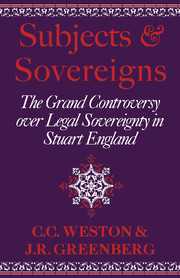Book contents
- Frontmatter
- Contents
- Dedication
- Preface
- 1 The shift in political thought
- 2 The keeper of the kingdom
- 3 The new age of political definition
- 4 That ‘Poisonous Tenet’ of co-ordination
- 5 The curious case of William Prynne
- 6 The idiom of restoration politics
- 7 Co-ordination and coevality in exclusion literature
- 8 The law-makers and the dispensing power
- Appendix: Co-ordination and resistance at the Revolution
- Notes
- Bibliography
- Index
4 - That ‘Poisonous Tenet’ of co-ordination
Published online by Cambridge University Press: 08 October 2009
- Frontmatter
- Contents
- Dedication
- Preface
- 1 The shift in political thought
- 2 The keeper of the kingdom
- 3 The new age of political definition
- 4 That ‘Poisonous Tenet’ of co-ordination
- 5 The curious case of William Prynne
- 6 The idiom of restoration politics
- 7 Co-ordination and coevality in exclusion literature
- 8 The law-makers and the dispensing power
- Appendix: Co-ordination and resistance at the Revolution
- Notes
- Bibliography
- Index
Summary
The wellspring of royalist ideology was the political theory of order, which assigned the king a commanding position in the state. Head of the commonwealth and supreme governor of the realm, he was God's vicegerent, his authority to rule dependent on divine commission. Just as God was the immediate source of royal authority, the king was the human source of law and political authority; and as the fountain of jurisdiction he was said to be above all jurisdictions. He possessed as God's lieutenant irresistible political power. It was to him that a binding oath of allegiance and supremacy was taken; and since political obligation was rooted in religious belief, those who commented on obligation usually quoted Romans 13:1: ‘The powers that be are ordained of God.’ The divine injunction to obedience in the fifth commandment might also be invoked. The patriarchal flavor so powerful in the pre-1642 period was reflected in Richard Mocket's God and the King (1615), which taught that a stronger and higher bond of duty united subjects with the king than children with the fathers of private families. Subjects must obey the king as God's vicegerent on earth, the bond between them inviolable and indissoluble. So impressed was James I that he made provision for the book to be studied in all the schools and universities and to be purchased by all householders in England and Scotland, and Charles II arranged for its republication in the first years of the restoration.
- Type
- Chapter
- Information
- Subjects and SovereignsThe Grand Controversy over Legal Sovereignty in Stuart England, pp. 87 - 123Publisher: Cambridge University PressPrint publication year: 1981



